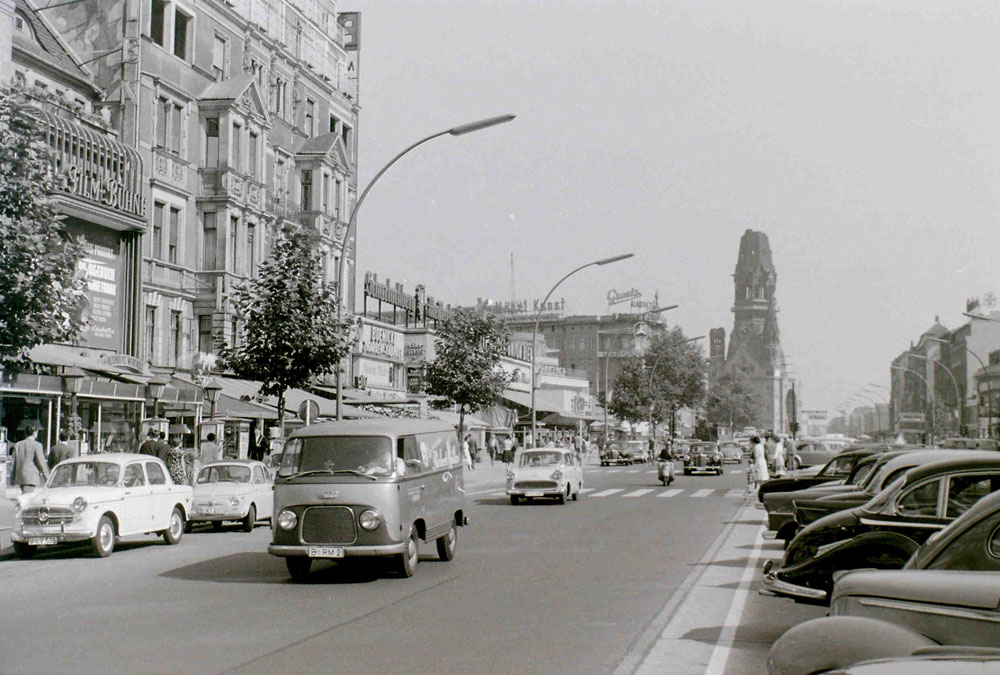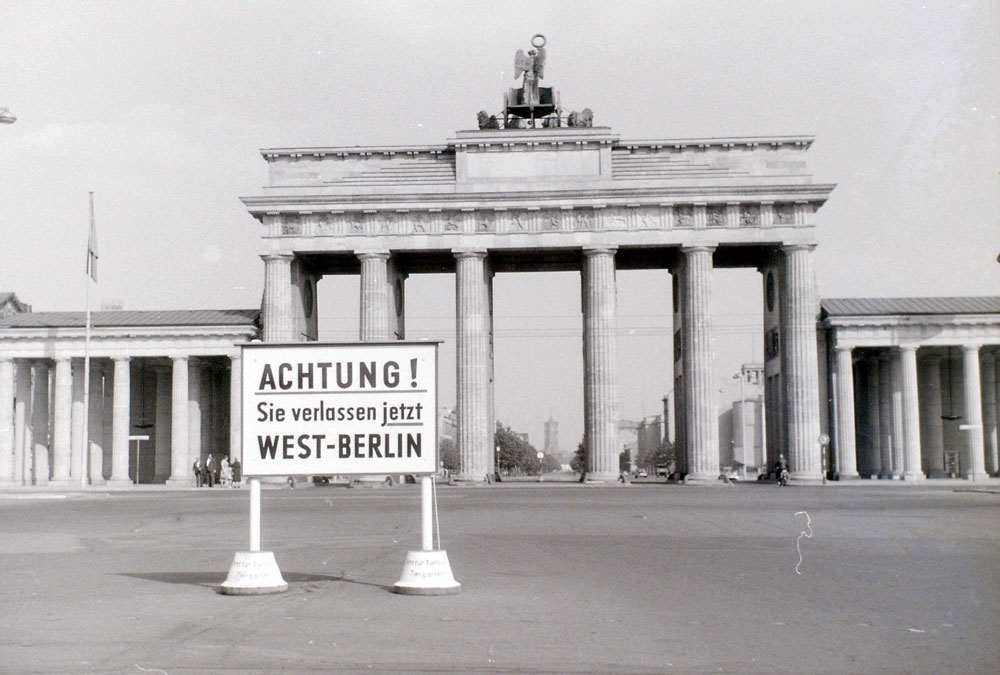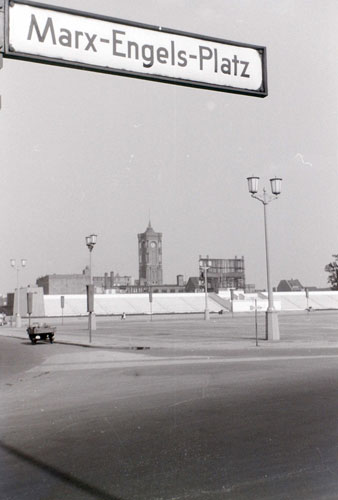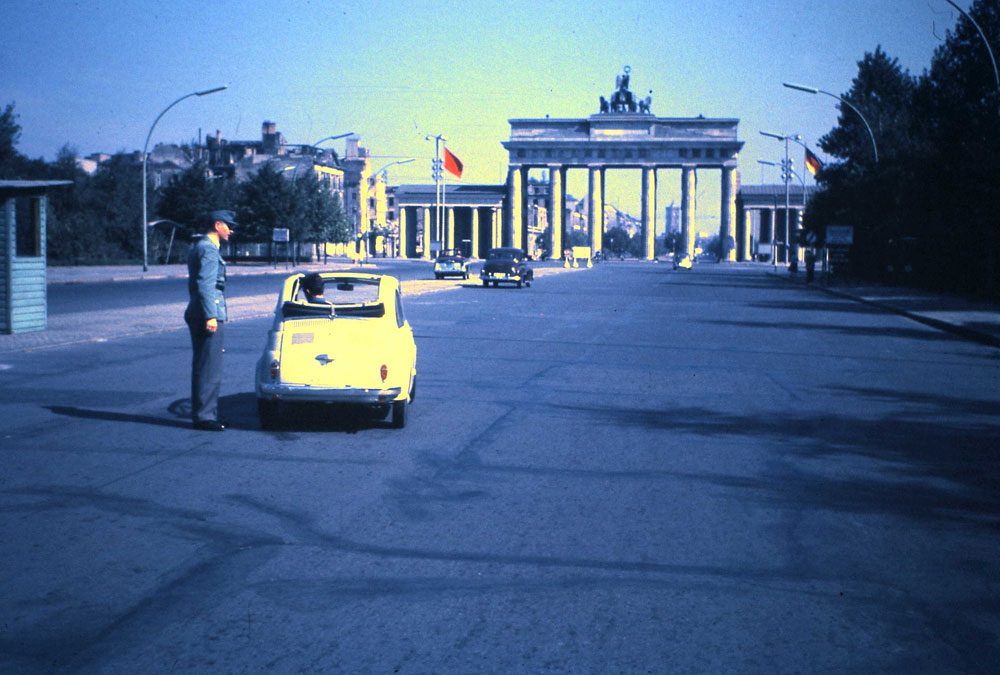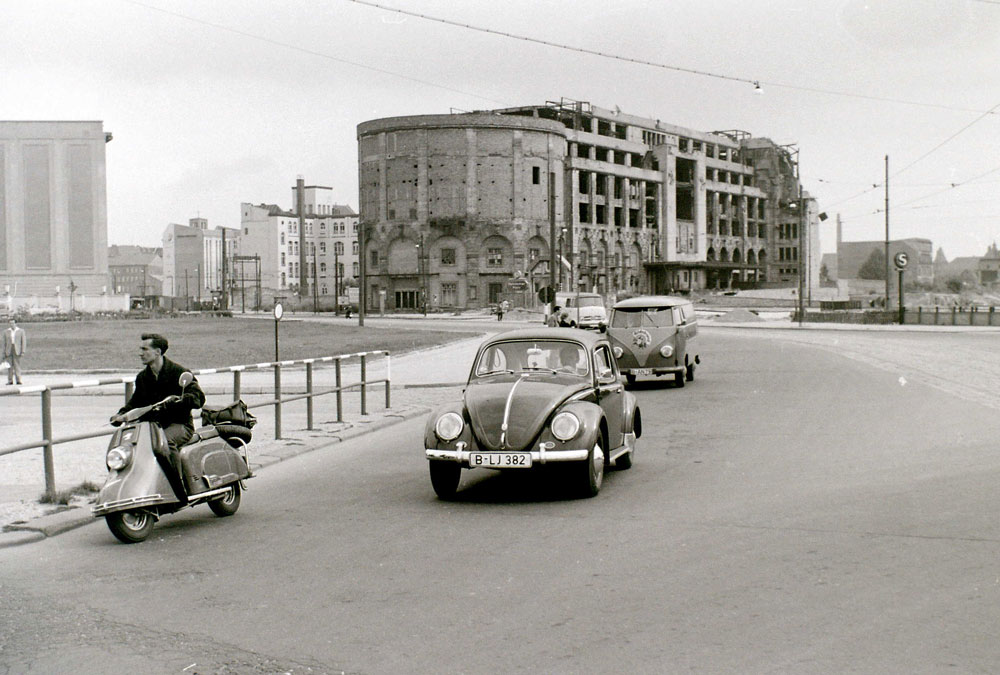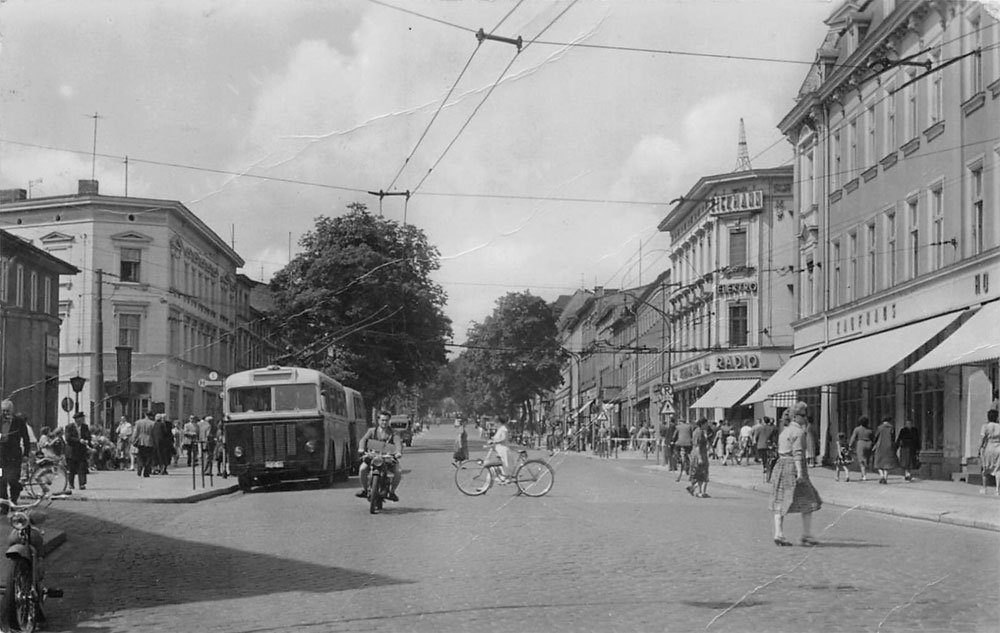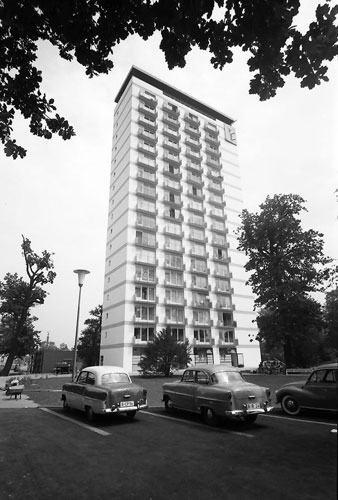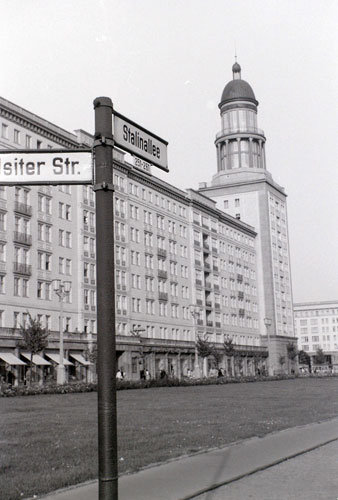Berlin and East Germany
In 1959 Henry received a British Council Travel Fellowship to Germany. He travelled to Hamburg where he visited the Soils Institute. When the Fellowship ended he travelled on to Berlin, Hamelin and then to France.
This page contains two letters that Henry wrote to his parents about his visit to Berlin. It includes a description of his day trip to East Germany (DDR) which involved visiting two Ministries and had to be notified to the People’s Police!
In his letters, Henry says he has taken some colour photographs of buildings. We have not been able to find these. Interestingly, the notebook he used for listing his transparencies shows a set of transparencies he took in Hamburg (immediately before his visit to Berlin) and a set of transparencies he took in France (immediately after his visit to Berlin). No Berlin set is listed. Maybe they were lost, or didn’t come out. Unfortunately, we can’t ask him.
In the absence of illustrations I wanted to find some 1959 photographs of Berlin I could include to give a flavour of what it would have been like when Henry was there. I found some excellent photos by photographer Allan Hailstone on Flikr, and contacted him to ask whether I would be allowed to use some of them on this page. Allan very generously gave me his permission. His photographs of Berlin, as well as his account of photographing the city despite restrictions placed on photography in the East, can be found in his book Berlin in the Cold War: 1959 to 1966.

Arrived here on Sunday afternoon. From Hamburg. The train passes through the Soviet Zone of Germany, and a transit permit through this Zone costs about 8/6 each way! Much of the way I was surprised to note was on one track – single line working: the other had been pulled up.
I’ve spent some time exploring the city; am staying in a small Pension a short distance from the famous Kurfürstendamm, which is a kind of Oxford Street. Yesterday I walked along this street, and along as far as the edge of the Soviet sector of the city, past the Brandenburg Tor (Marble Arch!) into the Soviet Zone down the Unter den Linden (the Mall!) to Marx Engels Platz, which is a bare waste of concrete with a platform at one end.
There is free interchange of people between West and East; in the roads at the western end stand three policemen in blue uniforms, and in the roads at the entry to the east zone stand three policemn in green uniforms, and these chaps stop cars and examine the drivers’ papers, but not pedestrians. To-day I went by underground into the East Zone; the Underground railway travels freely between east and west, and there are sightseeing tours which do the same. The only difficulty with the Underground is that you have to pay the fare in East Marks in the East Zone, the currency is quite distinct. It is not possible to buy things in the East Zone, East Marks can be bought in the West, 5 East Marks for 1 West, but can’t be used without some kind of permit, because East Marks when bought in the East Zone are exchanged at a 1:1 ratio. I haven’t sorted this one out yet!
To-day I went to see the Stalin-Allee, the show piece of the East Zone, and it certainly is impressive. Wide, open main street, with pleasantly designed shops and flats along the sides, and lawns along the pavements. Unfortunately, to-day’s weather was dull & overcast, so that I’ve left taking photographs until later.
I get the impression that the East Zone represents the east end of London as it were, including The Mall and some of the museum land. Much of this was devastated and still is not rebuilt. Some of the remaining ruins seem to me to have consisted of the most hideous masonry I’ve ever seen, extremely massive – perhaps they looked reasonable in their original surroundings but I doubt it. Certainly Berlin was largely destroyed and to-day both in East and West Zones there are enormous areas of cleared bare ground. One part of the West has been rebuilt in completely different style: where previously there were 4 or 5 story houses with gardens in the normal pattern there are now several really huge apartment blocks five times the height, with of course a correspondingly large amount of ground space between.
The Underground seems to consist of flimsy little yellow trains, which spend a lot of their time running above ground level on steel bridges. Another point that’s noticable in German road traffic is the smallness of many cars, and also the number of mopeds (autocycles) there are about, some fitted with pillion seats, which seems to me to overload the little things somewhat.
The Pension Berlin, where I’m staying, is in part of a terrace of old houses, and the rooms seem to have been made for giants. My ceiling must be thirteen feet high – may be more.
First impressions of Berlin are not as favourable as Hamburg, though I haven’t seen the larger parks yet.
Letter from Henry to his parents from Berlin, 20th July 1959.
Have had the letter in my pocket all day! Overcast and wet again: hope it clears tomorrow. Went to the cinema this afternoon to see Agatha Christies “Witness for the Prosecution”, in German, but dialogue was far too rapid for me to understand much.
Added note!

I had a most interesting stay in Berlin, though the weather was unusually wet and in fact on Wednesday I think a record rainfall was received. As I said before, it is quite possible to walk or go by train to East Berlin, the Soviet Sector, but to enter East Germany (the German Democratic Republic) is very much more difficult, and so is the buying of things in East Berlin.
I had earlier written to the Director of a Soils Research Institute at a place called Eberswalde in East Germany, and had a favourable reply inviting me to visit the same, so I thought I’d try to go. At an East Berlin travel agency I was sent to the Ministry of – well the German just won’t translate exactly, but I think the nearest is “Internal Affairs”. It is only possible to travel to the Democratic Republic for two reasons – to visit relations, or graves etc., and for business or professional reasons, so I produced the Director’s letter, and the matter was considered for a while, but it was decided that it must be notified to the People’s Police! So I was sent to the Ministry of – what seems to translate as “University Affairs” – but possibly “Education”, and there I had to fill in a form in quadruplicate concerning my business. This was Wednesday morning, and I wanted to go on Thursday – which is of course very short notice, though I hadn’t anticipated any special difficulties. After the form was considered, the lady concerned with the matter said she’d do her best, but couldn’t promise anything – come back to-morrow morning (“Our scientists have to wait eight weeks before they can get permission to go to a conference in England” she explained “not that of course that is any reason for us to do the same thing”).
So back I came on Thursday morning, and found my forms had been signed by two high officials in the State Secretary’s Office, one with the name of “Ulinski”, and all was in order – the forms were handed back to me by a perfectly charming young woman who shook my hand and said that I had to go back to the previously mentioned Ministry and obtain a visa, and the name and office of the appropriate official given to me. So, twenty minutes walk to the Ministry, and the visa was duly placed in my passport. I passed through a room where there must have been fully forty people waiting for visas – presumably to visit relations – just like a ration-book office during the war (or the Immigration Office in London for Canadian immigrants). At both Ministries everyone who enters is given a little paper slip, which has to be returned on leaving. The person to whom everyone had to report on entering the Education Ministry was an old lady of about 60, who phoned the official she thought that one had business with, and then handed one the telephone to explain said business with!
Armed with the visa, I could then buy the rail ticket. At the station, the passport was checked, money changed from West German Marks into East German Marks, and the ticket provided. I had brought some sandwiches with me, in case I couldn’t buy a dinner, though I’m rather sorry now I didn’t try! So I went to Eberswalde, was shown over the research station by a very pleasant young scientist (the Professor Director had only got back from his holidays that day, and wasn’t yet in; when telephoned by the young scientist he offered to come in if I was specially interested in some particular work they had done but had now finished with: I was not especially interested in that work, and so did not meet him (but thought it very good indeed of him to offer)). The young scientist seemed very keen on his work and generally very pleased with life, and looking forward to continuing as an academic scientist in a new institute that was being built. The labs did appear a bit scruffy, they were old, but did have some very good new equipment. No more though than others I’ve seen (including our dept in the School of Ag. until two years ago!). The work, too, was interesting, and they seem to have similar academic freedom to other countries. He told me that they could travel to most eastern countries, and Sweden, Switzerland, etc., but not France or Britain, or West Germany (except West Berlin). He then took me to see some more institutions that were being built – in his motor-cycle side-car, and then to the station. It was a most worthwhile experience.
Berlin at present seems to be of particular value for the meeting of East and West. No West German may go to East Germany – except to visit relations, which requires the special visa, and is only issued for the particular town in which the relations live, and for a specified period. The visit may only be made by the most direct possible route. But any West German may visit West Berlin, and consequently East Berlin. And the same goes for the East Germans; they may only visit East and therefore West Berlin, not West Germany. The old lady with whom I had breakfast this morning was on holiday from East Germany, in West Berlin. It seems from her account that it’s still very dangerous to criticise the regime in East Germany, and she said it was a relief to be where one could still speak freely.
As far as cash goes, no West Berliner is allowed to spend any money in East Berlin without a special pass. When I changed my marks to buy the railway ticket, I was given a receipt which was stamped by the clerk in the booking office to check what it was spent on! Vice versa. East Berliners are allowed to buy things in West Berlin, but only at the West Berlin rate of exchange, that is I think about 25 West Marks for 100 East Marks, although in certain cinemas and theatres the rate of 100 West for 100 East is allowed.
So that’s how some things stand at present – I’m sorry to have had to set it all down at this length!
As far as the rest of my time in Berlin was spent, the rest of Wednesday morning and afternoon went in trying to photograph some of the buildings in the rebuilt Hansa district, all of what Dad would call “packing case” style, but interesting nonetheless. Also in getting wet! I then changed and went out by underground to the Free University (West Berlin) to meet a lecturer in the English Department who was previously in Cambridge and who was introduced to me by letter by a fellow microbiologist and county dancer in Cambridge. He showed me some of the university, largely built with American aid, and invited me to his parents’ home for dinner. He is a very scholarly person, his room at home full of books on English literature and language and dictionaries and works of reference enough to stock a public reference library. He is coming to England for three months shortly in order to have library facilities for working on his thesis, to do with the development of hymns in the Middle Ages !!!
On the Thursday I saw the new buildings in East Berlin, the Stalin-Allee – their showpiece, and very fine it is too. Again, I have some colour photos, but the weather was always overcast. They are built in a much more conservative style than West Berlin’s showpieces, but I’m sure would please Dad rather than those of West Berlin.
And now, somewhat sleepy, in the “Railway Hotel” in Hamelin, a very pleasant and newly decorated hotel. I must say, I like the hours of eating and drinking here – anytime. Certainly Germans must be upset when they come to England and want a beer at the end of a hot afternoon at 5 o’clock and have to wait until six (and then find more often than not that the beer is warm; it’s all delightfully cool over here). And more upset when they find dinner’s “off” after 8 o’clock: here it seems to be “on” indefinitely – last night I had a meal at 10:30 in my normal little restaurant off the Kurfurstendamm. Ah well, other Countries, other manners.
And so to bed – “feather bed” of course: all the beds I’ve slept in in North Germany have been of this sort, just a single covering like a thin eiderdown covered with a “sheet” like a big pillow case. Saves trouble making the beds!
Love, dears, from your wordy Tim.
Letter from Henry to his parents from Hamelin, 24th July 1959.
PS: Notice any differences in the stamps on this envelope? Look carefully!!

[Return to top of page.]
[Return to main Abroad page.]
[Return to main Life page.]

